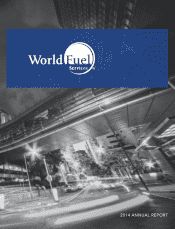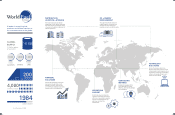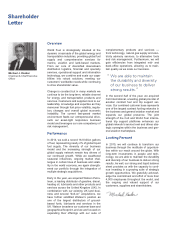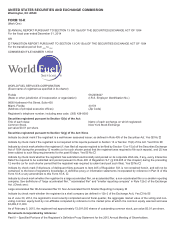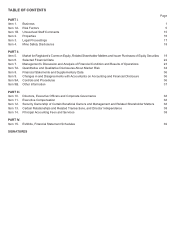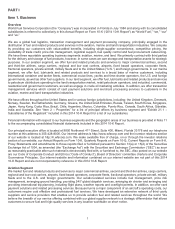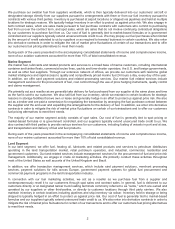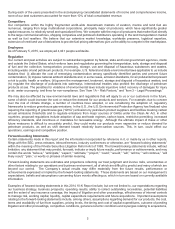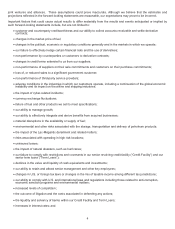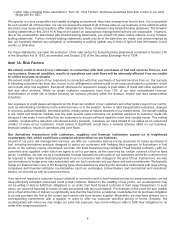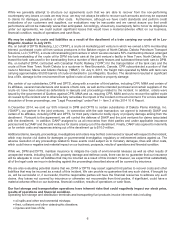World Fuel Services 2014 Annual Report Download - page 11
Download and view the complete annual report
Please find page 11 of the 2014 World Fuel Services annual report below. You can navigate through the pages in the report by either clicking on the pages listed below, or by using the keyword search tool below to find specific information within the annual report.6
While we generally attempt to structure our agreements such that we are able to recover from the non-performing
counterparty any losses or costs we may incur, we may not always be able to recover such amounts and may be exposed
to claims for damages, penalties or other costs. Furthermore, although we have credit standards and perform credit
evaluations of our customers and suppliers, our evaluations may be inaccurate and we cannot assure you that credit
performance will not be materially worse than anticipated. Accordingly, should any counterparty fail to honor its obligations
under our agreements, we could sustain significant losses that would have a material adverse effect on our business,
financial condition, results of operations and cash flows.
We may be subject to costs and liabilities as a result of the derailment of a train carrying our crude oil in Lac-
Mégantic, Quebec in July 2013.
We, on behalf of DPTS Marketing, LLC (“DPM”), a crude oil marketing joint venture in which we owned a 50% membership
interest, purchased crude oil from various producers in the Bakken region of North Dakota. Dakota Petroleum Transport
Solutions, LLC (“DPTS”), a crude oil transloading joint venture in which we also owned a 50% membership interest, arranged
for the transloading of the crude oil for DPM into tank cars at the joint venture’s facility in New Town, North Dakota. We
leased the tank cars used in the transloading from a number of third party lessors and subleased these tank cars to DPM.
We, on behalf of DPM, contracted with Canadian Pacific Railway (“CPR”) for the transportation of the tank cars and the
crude oil from New Town, North Dakota to a customer in New Brunswick, Canada. CPR subcontracted a portion of that
route to Montreal, Maine and Atlantic Railway (“MMA”). On July 6, 2013, the freight train operated by MMA with tank cars
carrying approximately 50,000 barrels of crude oil derailed in Lac-Mégantic, Quebec. The derailment resulted in significant
loss of life, damage to the environment from spilled crude oil and extensive property damage.
We, certain of our subsidiaries, DPM and DPTS, along with a number of third parties, including CPR, MMA and certain of
its affiliates, several manufacturers and lessors of tank cars, as well as the intended purchaser and certain suppliers of the
crude oil, have been named as defendants in lawsuits and proceedings related to the incident. In addition, orders were
issued by the government of Quebec against CPR, MMA and us, requiring CPR, MMA and us to recover the spilled crude
oil caused by the incident and to otherwise fully remediate the impact of the incident on the environment. For a more detailed
discussion of these proceedings, see “Legal Proceedings” under Part I – Item 3 of this 2014 10 K Report.
In December 2014, we sold our 50% interest in DPM and DPTS to certain subsidiaries of Dakota Plains Holdings, Inc.
(“DAKP”), our partner in the joint ventures. In connection with the sale transaction, we agreed to indemnify DAKP and
certain of its affiliates, including DPM and DPTS, for third party claims for bodily injury or property damage arising from the
derailment. Pursuant to the agreement, we will control the defense of DAKP and the joint ventures for claims associated
with the derailment. In addition, DAKP assigned to us all recoveries from third parties and under applicable insurance
policies held by DAKP and the joint ventures for claims arising out of the derailment. Finally, DAKP also agreed to indemnify
us for certain costs and expenses arising out of the derailment up to $10.0 million.
Additional claims, lawsuits, proceedings, investigations and orders may be filed, commenced or issued with respect to the incident,
which may involve civil claims for damages or governmental investigative, regulatory or enforcement actions against us. The
adverse resolution of any proceedings related to these events could subject us to monetary damages, fines and other costs,
which could have a negative and material impact on our business, prospects, results of operations and financial condition.
While we, DPM and DPTS, maintain insurance to mitigate the costs of environmental releases as well as other results of
unexpected events, including loss of life, property damage and defense costs, there can be no guarantee that our insurance
will be adequate to cover all liabilities that may be incurred as a result of this incident. However, we expect that substantially
all of the legal costs we incur in defending against the proceedings described above will be covered by insurance.
We are also evaluating potential claims that we, DPM or DPTS may assert against third parties to recover costs and other
liabilities that may be incurred as a result of this incident. We can provide no guarantee that any such claims, if brought by
us, will be successful or, if successful, that the responsible parties will have the financial resources to address any such
claims. Any losses not covered by insurance or otherwise not recoverable from third parties, if significant, could have a
material adverse effect on our business, financial condition, results of operations or cash flows.
Our fuel storage and transportation operations have inherent risks that could negatively impact our stock price,
results of operations and financial condition.
Operating fuel storage and distribution terminals and transporting fuel products involve inherent risks including:
• oil spills and other environmental mishaps;
• fires, collisions and other catastrophic disasters;
• injuries and loss of life;

